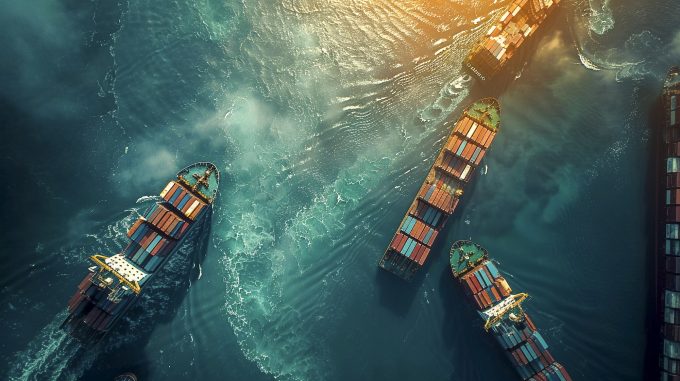WSC appoints Soren Toft and Randy Chen as new chair and vice chair
MSC boss Soren Toft and Randy Chen, vice chairman of Wan Hai, have become chair ...
FDX: ABOUT USPS PRIVATISATIONFDX: CCO VIEWFDX: LOWER GUIDANCE FDX: DISRUPTING AIR FREIGHTFDX: FOCUS ON KEY VERTICALFDX: LTL OUTLOOKGXO: NEW LOW LINE: NEW LOW FDX: INDUSTRIAL WOESFDX: HEALTH CHECKFDX: TRADING UPDATEWMT: GREEN WOESFDX: FREIGHT BREAK-UPFDX: WAITING FOR THE SPINHON: BREAK-UP ALLUREDSV: BREACHING SUPPORTVW: BOLT-ON DEALAMZN: TOP PICK
FDX: ABOUT USPS PRIVATISATIONFDX: CCO VIEWFDX: LOWER GUIDANCE FDX: DISRUPTING AIR FREIGHTFDX: FOCUS ON KEY VERTICALFDX: LTL OUTLOOKGXO: NEW LOW LINE: NEW LOW FDX: INDUSTRIAL WOESFDX: HEALTH CHECKFDX: TRADING UPDATEWMT: GREEN WOESFDX: FREIGHT BREAK-UPFDX: WAITING FOR THE SPINHON: BREAK-UP ALLUREDSV: BREACHING SUPPORTVW: BOLT-ON DEALAMZN: TOP PICK

2M Alliance members Maersk and MSC have reduced port calls in Europe on upcoming sailings to avoid congestion after ocean shipping demand from China to North Europe continued to break records in June.
The Danish shipping giant advised customers yesterday: “In light of the current supply chain bottlenecks faced across the network, we are implementing measures to improve schedule reliability on the Far East Asia to North Europe network.”
The move is a bid to improve schedule reliability on three services within the 2M network: the AE6/Lion, AE7/Condor and AE55/Griffin.
The AE6/Lion service will miss its port call in Rotterdam, one of two in Antwerp and add a call in Le Havre on its 432W sailing with MSC Michel Cappellini.
The AE7/Condor will eliminate its port call in Le Havre on the 433E sailing of Maersk Horsburgh. And the AE55/Griffin will also omit Le Havre, as well as Colombo and Singapore, but add Hong Kong and Yantian, with Colombo cargo transhipped from Hong Kong, on voyages 432W on MSC Vandya and 431E on MSC Amsterdam.
Switzerland-based MSC said: “The updated network is designed to improve our services, offering new port pairs, and adapt to the ongoing challenges of port congestion in Europe, while continuing to offer competitive transit times for shipments between Asia and North Europe.”
Data this week from Xeneta and Container Trade Statistics shows 800,000 teu shipped from China to North Europe in June – a record monthly figure on this trade.
Xeneta chief analyst Peter Sand explained: “Shippers assessed the impact of the Red Sea conflict on ocean supply chains and are not prepared to take the risk of repeating the chaos of the pandemic years.”
But he noted that wanting to protect their supply chains “has come with a heavy price tag” for shippers.
Indeed, the record volumes in June coincided with spiralling average spot rates on trades from the Far East to North Europe: Xeneta data show spot rates increased by 166% between 30 April and 1 July.
“Shippers that rushed imports may have spent far more than they wanted to, but they clearly felt it was a price worth paying to lower the level of risk in their supply chains later in the year,” added Mr Sand.
But Xeneta noted that there had been signs that the record levels of demand for container shipping from China to North Europe may have peaked.
“There is a clear correlation between record-breaking volumes and spot market developments on the major trades from China to North America and North Europe,” said Mr Sand.
Average spot rates from the Far East to North Europe have fallen by 1.6% since 31 July.
“If we are now seeing spot rates softening, that would suggest we have also already seen the peak in demand for ocean container shipping, and volumes should be lower in July and August, during what would ordinarily have been the peak season,” commented Mr Sand.
Listen to this clip from the recent Loadstar Podcast to hear Host Mike King speaking to Loadstar Managing Editor Gavin Marle with insight from Xeneta about the container rates now vs Covid – and have they plateaued?
However, Chris Higgins, commercial director at AFS Global, told The Loadstar: “As we head towards the first winter season using this diverted sailing route [around the Cape], compounded by still-reduced capacity and equipment out of position, we don’t see freight rates reducing as quickly as they ramped up.
“Demand may revert to a maintainable level, but with [October’s] Golden Week, winter weather and an early Chinese New Year in 2025, we believe the challenges still lie on the supply side and may cause importers to overorder to ensure they aren’t caught short.”
Comment on this article